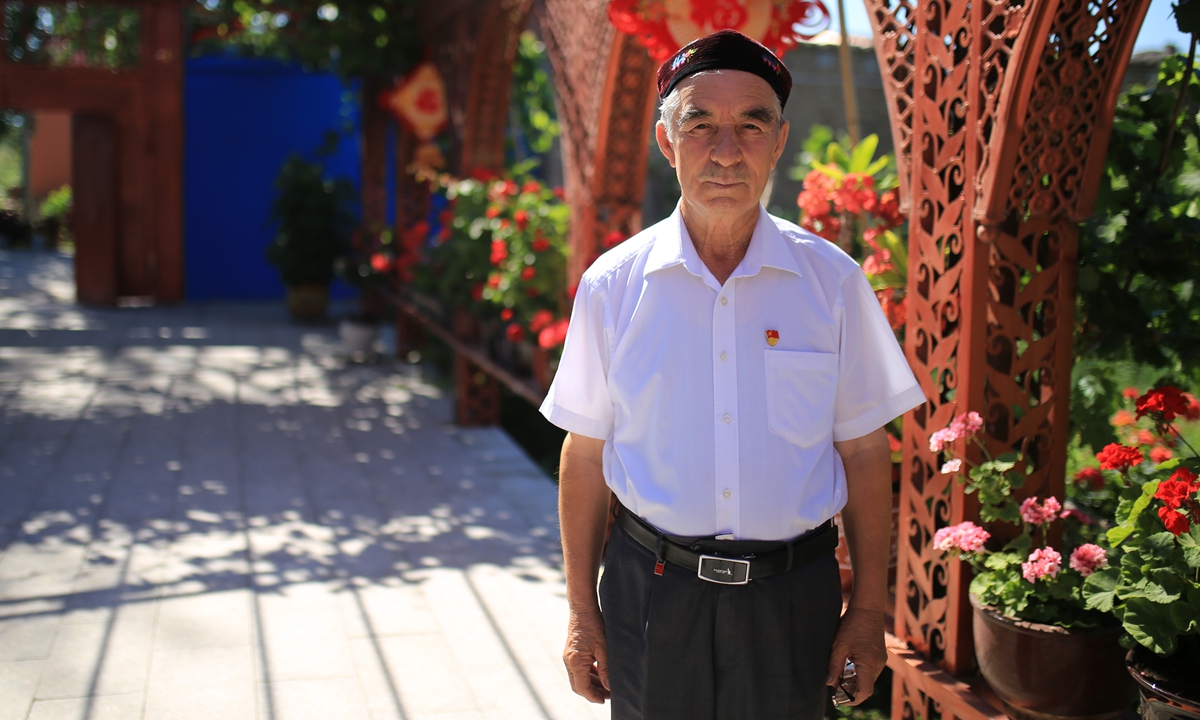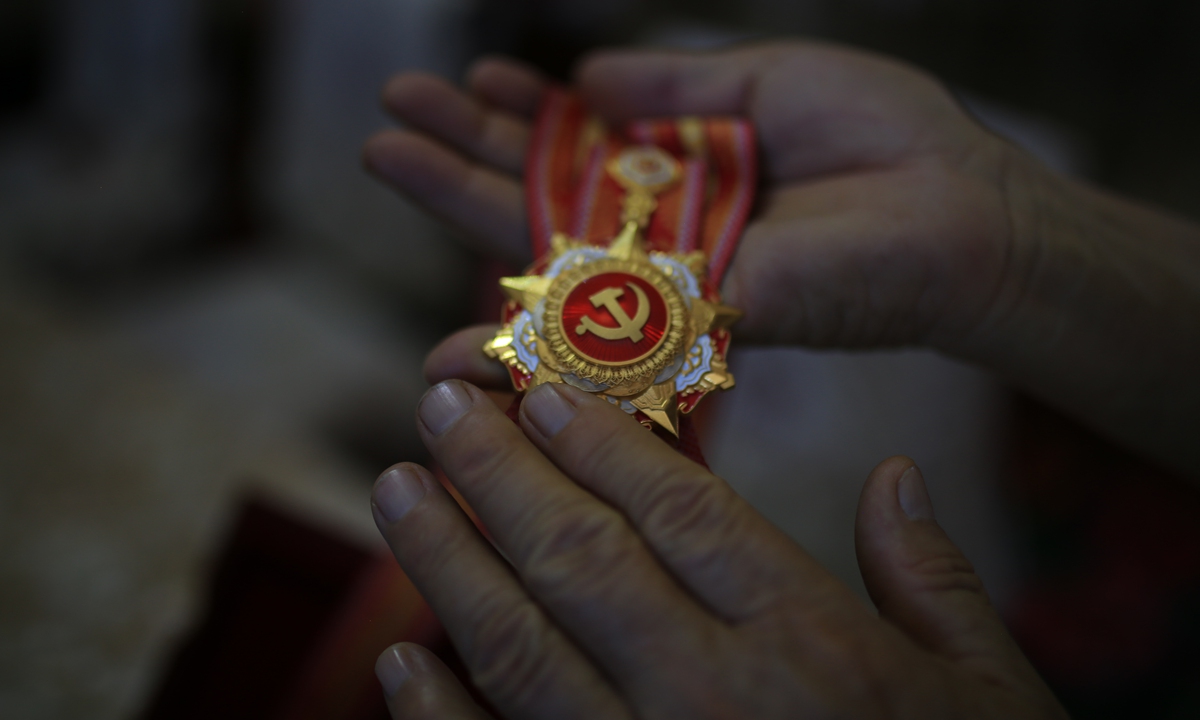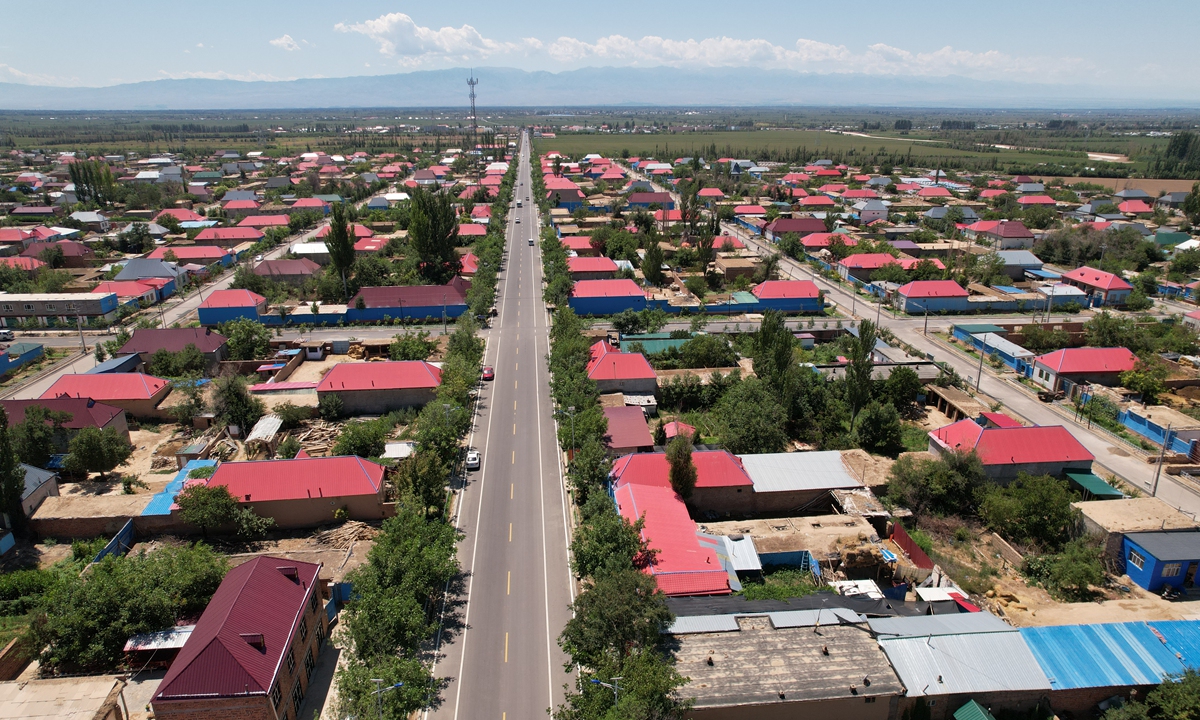Editor's Note: Turn on the engine, kick the car into gear and roar out - Memetjan Wumer, 70, drives with the passion of a 17-year-old boy. But when he retrieved the July 1 Medal from its box, he did so with great care - seeming to worry that any callousness would break the solemnity.
Memetjan is one of the 29 members of the Communist Party of China (CPC) who have made outstanding contributions to the Party and the people, and were awarded with the July 1 Medal by Xi Jinping, general secretary of the CPC Central Committee on June 29 in Beijing.
The Global Times reporters visited Kulikai village of Yining county, Northwest China's Xinjiang Uygur Autonomous Region in late July and were regaled with stories of the village's Party chief on how the village has had no single violent terror attack in more than 30 years.
"The moment I took the oath of joining with the CPC, I told myself to listen to the Party, follow along with it and serve the people with all my hearts," Memetjan said, adding "for all these years, I dare not to say I fulfill the promise 100 percent accurately, but have made sure it is at least 80 percent."

Memetjan Wumer Photo: Fan Lingzhi/Global Times
GT: Could you depict the moment you received the July 1 Medal?Memetjan: Thanks to the care from the CPC Central Committee and the support from the people of all ethnic groups, I got the July 1 Medal and had the chance to attend the ceremony in Beijing at the 100th anniversary of the founding of the CPC. To me, a grassroots official in Xinjiang, this is the highest of honors.
When General Secretary Xi awarded me with the medal, I was so excited and wanted to share so many things with him and did not know how to express them in words. My first sentence to him was "Hello, General Secretary Xi!" He said to me "You have done a very good job!" and I said, "Thank you."
On July 1, together with other recipients of the medal, I sat on the Tian'anmen Rostrum to listen to the General Secretary Xi's speech. When he said, "Long live our great, glorious and correct Party! Long live our great, glorious and heroic people!" I couldn't help but give a standing ovation with tears in my eyes.

Memetjan displays his July 1 Medal. Photo: Fan Lingzhi/Global Times
GT: When you were re-appointed as the Party chief of Bulikai in 2006, what was the situation in the village?
Memetjan: In 2006, the village was listed as one of its key targets hidden dangers of public security. I was retired at that time but was re-appointed as the Party chief of the village. The situation was complicated with one of the biggest problems being the laxness of officials. The village was under the growing influence of extremism. Young people, for example, idled around without working and women began to wear burqas.
Some village officials turned a blind eye to the problems reported by the villagers, and some even colluded with relatives to encroach on collective land. Villagers were unsatisfied with them.
Before coming back to my position as the Party chief of the village, I thought a lot on how to handle these problems and concluded that it was time to make the Party members play their roles. On the third day of my returning, I called 49 Party members in the village to have a meeting but only 18 came.
I was sad and decided to talk to them one by one on why they did not show up and why they - as Party members - went to mosques. Some told me that religious figures had threatened not to host their funeral ceremonies if they did not visit the mosques.
I told them all these problems would be solved eventually and after this initial round of communication, 80 percent of the Party members came to attend the meeting during which we discussed how to solve the problems in the village. We finally decided to start two classes in the village for men and women respectively to promote national laws and regulations, and to explain national policies.
Meanwhile, we also contacted with the public security bureau to help solve problems that had jeopardized social security. Gradually, the situation became stable.
We also started to deal with the concerns of villagers, for example the embezzlement of funds by officials. Some officials took 500 mu (33 hectares) of land for 30 years by self-drafted contracts with the fees and land rates for each year at only 60 yuan per mu while the going market price was 150 to 200 yuan. We took back the land and found contractors in accordance with laws and regulations. We used similar methods to take back another 200 mu of land that had been taken by relatives of some officials.
The public security bureau and procuratorate of the country officiated over illegal cases. Two officials were sentenced to jail, one was expelled from the Party, and two were placed on probation within the Party. After cleaning these corrupt officials, villagers became active in joining the activities of the village.

Police officers and children in pastoral areas share a holiday cake to celebrate June 1 Children's Day on May 30 in Changji Hui Autonomous Prefecture. Photo: IC
GT: Was it easy to deal with these officials?
Memetjan: One of the officials who had grabbed collective land was an intimate friend with whom I grew up. When I said to deal with the land grabbing, a Party member stood up and said, "We are not suspicious about you, but what you are going to deal with includes your friend." I promised them not to extend any indulgences to anyone.
A promise is a promise. I went to talk to my friend and persuaded him not to go astray any further before it was too late. He kept saying he was innocent. But later he was found to have embezzled 60,000 yuan.
I am not a man with a stone heart. When seeing him being taken away by the police, I cried. But I did not regret what I had done for it had been for the village and I had done nothing wrong.
His family cut ties with mine for a year. After he was released, he visited my house one day and invited me to attend his son's wedding. He said that it hadn't been my fault but his, and thus I attended the wedding.
GT: During your 30-year tenure as the Party chief of the village, there have been no violent attacks that have happened. Were there any plots uncovered by you before they were carried out? Memetjan: When I returned, I began to regulate the religious affairs since once they went wrong, there would be huge problems. If some religious figures who had planned something and planted distorted or extremist thoughts in everyday sermons to villagers, the thoughts of the villagers would obviously be altered.
In our village, we organize for clerics to have group study every Thursday and we also attend the gatherings and sermons on Friday.
We discovered two illegal sites where religious doctrine was being taught religious one hosting 28 children and another with 38. We contacted relevant departments to deal with the case. After that no violent activities have happened in the village.
Children who were indoctrinated in the illegal sites are from 5 to 12 years old - the age that they should be at school. If we did not crack down on the sites, these children had the potential to become further radicalized and finally commit illegal activities.
In 1996, one villager told me that he was about to host a gathering with many young people expected to participate. At first, I thought it was a traditional activity. But a few minutes later, I felt unusual about the incident and wondered what the activity was for.
I kept asking the villager and ultimately found out that they did not dance, nor sing, nor drink at the gathering but listened to sermons designed to indoctrinate them.
How could such activity be called normal gathering? After investigating, I found that there had been 63 people engaged in the activity. I reported the case to relevant departments and persuaded these people to be dismissed. I also talked to the parents of the young people to claim their children and take them back home. Otherwise, these parents were likely to regret further in the future.
Finally, only eight people remained who insisted on proliferating the illegal activity even though we ultimately compelled them to stop.
When a terror attack happened in Yining county on February 5, 1997, we deployed 180 Party members from the village to road junctions and entrances to prevent suspicious people from entering our village. Nothing happened in our village.
In the same year, on June 26, on my way back to the village from a meeting, I got a flyer from some passers-by. I looked into it and found it to be about splitting up the country and terrorism.
I immediately had a meeting that very night and asked that all the flyers be found and removed from any place posted including being pasted on wire poles. Ultimately we recovered 68 flyers.
Although we seized the flyers, I still could not sleep that night and thought about who had spread them. I thought the incident may have been related to the previous illegal gathering. I talked to the brother of a member from the previous illegal gathering and found my suspicions were correct. The man said that his younger brother took an oath with a group of terrorists at a farm yard and threatened to kill those who disturbed the distribution of the flyers. I persuaded the man to report to the police in a timely fashion to allow the police to deal with the case accordingly.

A tourist in an ethnic flower hat dances at a traditional folk house in Yining on May 4. Photo:IC
GT: As you had removed the threats at an early stage, were you threatened by terrorists?
Memetjan: Yes. One time while I working overnight and did not return home, my family members informed me that four people had entered my yard that previous night and attempted to ransack it. The yard was a mess in the morning. I used to say in the meetings that if anyone wants to come to me, they can come. I am here and will not run.
Saying that I was not afraid at all would be dishonest, but I as a Party member and a Party chief of the village, I did not want to be a deserter.
GT: We have learned that you have insisted on promoting Putonghua in the village. Why?
Memetjan: When we were in school, there were few classes on the common language and very few people can now speak Putonghua. I encountered some difficulties in work due to poor Putonghua and did not know how to express myself. I know the importance of leaning the common language and began to promote it in the village. Children in the village need to learn it from kindergarten level and it will be beneficial to their future study and work.
GT: How do you evaluate your work?Memetjan: My father died when I was 3 years old and my mother remarried. I was raised almost exclusively by the Party with the help of the villagers. We were poor when I was in school and my grandparents usually went to work early in the morning and returned late at night. I usually slept under trees and was fed by villagers. I have deep love for them. Why do villagers support me? Because I was raised by them and they trust me. Therefore I want to serve them well
The moment I took the oath of joining the Party, I told myself to listen to the Party, follow along with it, and serve the people with all my hearts. For all these years, I dare not to say I fulfilled the promise 100 percent, but have made sure it is at least 80 percent.

Kulikai village of Yining county, Northwest China's Xinjiang Uygur Autonomous Region Photo: Yang Ruoyu/Global Times








